"We will never forget them, nor the last time we saw them, this morning, as they prepared for their journey and waved goodbye and 'slipped the surly bonds of Earth' to 'touch the face of God.'"
-John Gillespie Magee, Jr.; spoken by Ronald Reagan after the Challenger tragedy
Twenty-five years ago today, I remember being a student in my second grade classroom. It was a big day, because they were launching the first schoolteacher into space, Christa McAuliffe, along with a crew of NASA astronauts.

Televisions were wheeled into our classrooms so we could watch the launch live on television. While these astronauts weren't going to the Moon (which was -- to my second grade mind -- the coolest thing any astronaut could ever do), they were getting to ride into outer space aboard the Space Shuttle Challenger.
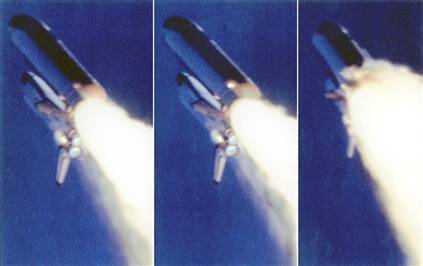
Watching ascending rocket closely, you could see that something might be wrong. The main tank appeared to catch on fire, and the flames from the rockets beneath seemed to rise up the spacecraft. But nobody was prepared for what happened next.
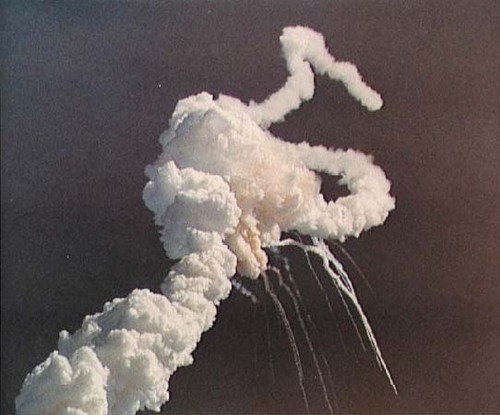
Although we had no way of knowing at the time, the entire crew of seven -- Gregory Jarvis, Christa McAuliffe, Ronald McNair, Ellison Onizuka, Judith Resnik, Francis Scobee, and Michael Smith -- most likely weren't immediately killed by the explosion, but rather by either depressurization and freezing, or by impact with the sea below.
But like any tragedy, we had to deal with it. How did we do?
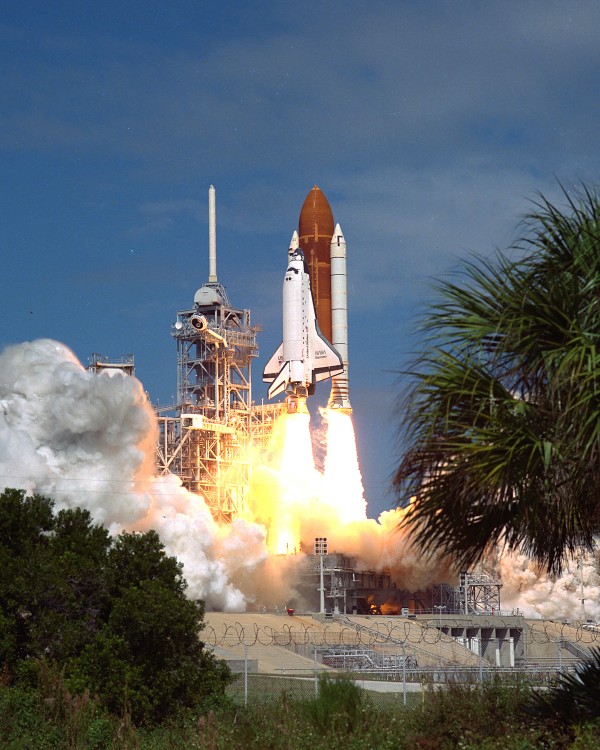
Well, we found and fixed the flaws that caused the accident, and returned to space 32 months later with the Space Shuttle Discovery.
But we lost a lot more that day, 25 years ago, than the seven brave women and men aboard the Challenger. As a nation, we lost our eagerness for human space exploration in a way that would have been unfathomable 20 years prior.

Above is a picture of Virgil 'Gus' Grissom, one of the Apollo 1 astronauts killed in a launch pad fire. Perhaps prophetically, he knew that what he was taking part in was a risky endeavor. And he said the following:
"If we die, we want people to accept it. We're in a risky business, and we hope that if anything happens to us it will not delay the program. The conquest of space is worth the risk of life." -Gus Grissom
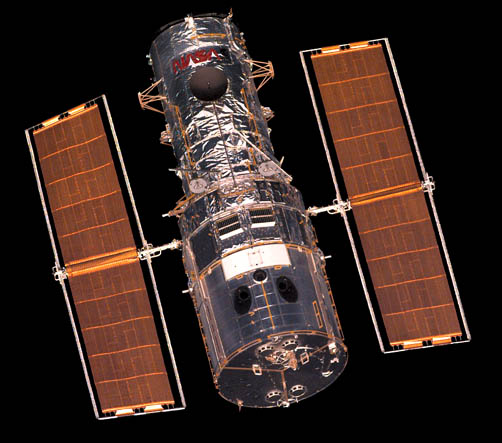
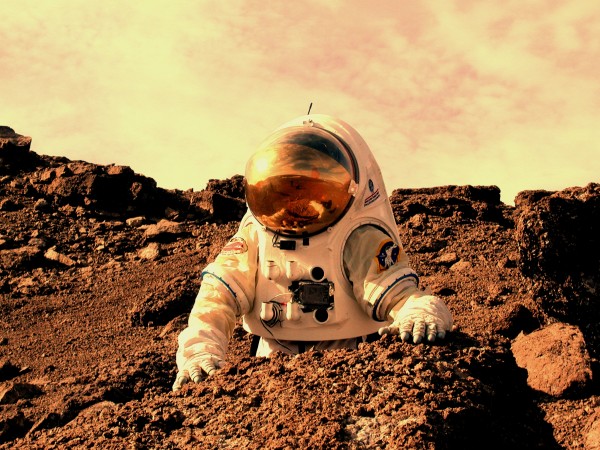
But why have so many of us given up our dreams of traveling to, exploring, and eventually living on other worlds, or even other star systems? Perhaps the world is finally ready to take on what -- perhaps -- no one nation can finance itself: a manned interplanetary journey?
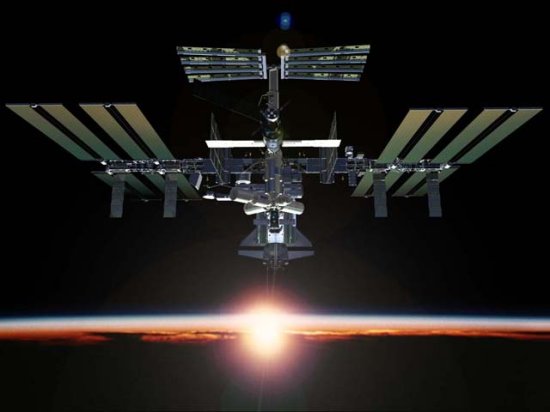
I mean, really, the International Space Station isn't about doing objectively groundbreaking science. It's about a human presence in space, and about all our nations' dreams of taking that next breathtaking step.
Maybe it's time to dream again, and to literally reach for the stars. In addition to (and separate from) NASA's science budget, how about we start work on human exploration once again? (Hey Barack, seriously, best use of stimulus funds ever!) I know I would love to see it, and I know many of you would, too.
So today, I won't just be remembering the seven brave souls who tragically lost their lives, I'll remember the spirit with which they bravely stepped into that shuttle, putting their lives on the line to explore just a little bit farther into the abyss. And I'll hope that this will prove to be, in fact, just the beginning.
- Log in to post comments

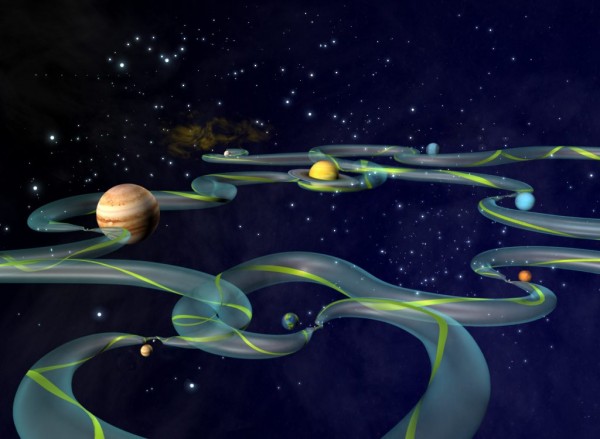
"They shall not grow old, as we that are left grow old,
Age shall not weary them nor the years condemn.
At the going down of the sun, and in the morning,
We will remember them."
I hope politicians have learned to listen to scientist and engineers ... Always give credence and priority to the people in the field, they will not lead you astray.
Politicians must counter their arrogance with reality.
And I hope I live long enough to see interplanetary human space flight, and when it happens I (again) hope that Earth will be in great enviromental health, a place where the astronauts will be proud to return.
Great write up Ethan!
Oil was a temporary phenomemon and is nearly over. We shouldn't be deluding ourselves that space travel is possible when we're dependent on a fossil fuel.
Sending people into space is an ego trip; it's nationalism, not science. And even if oil isn't a consideration, human space travel adds ridiculous levels of cost, anywhere from five to ten times the cost and weight of a satellite. You don't have to worry about keeping a satellite supplied with air or survivable temperatures.
The US and other countries would do far better by pooling their resources and building more Hubble telescopes, possibly using the moon as a steady platform to base them, rather than placing them in orbits which inevitably decay. That's where most of the usable science has come in the past 20 years.
.
I don't know about that squiggly thing around all the planets, but yeah, I lean towards exploration even if it is suboptimal for a lot of goals. The cost would still be a fraction of the cost of any of a large number of things that are totally suboptimal that we do anyway, like sports. Or war.
The tragic Y produced by the trailing exhaust of Challenger is a grim and ironic reminder that (why)-*reason* is a human endeavor and the why question is pertinent only when viewed from a past, passive, experience.
If you have to ask why, in retrospect, then it is a failure of the Human quest.
The Challenge, is to maintain the logical, present, How question.
Teach children to...Ask howâ¦not why.
In August of 1983 I saw the Challenger take off- it was about 2:35AM on a cloudy night. I took a couple decent pictures of the liftoff.
I believe it was the first night launch and had the first African-American on board.
After the Challenger disaster I was going to send one of the photos to NASA but never did...
I was only 16 months old when this happened. I wish I was older so I could experience it with the rest of the world, even though it was such an awful thing...
I can't speak for the rest of the world, but personally, I have no interest in human space travel because I simply don't think we belong there. We didn't evolve to spend any time in space. The one place in the universe that is most friendly for human life is right here, Earth, our home planet. (If only we could focus our energies on NOT trashing our home, eh? Our species is like an angry 80s rock band, and we're treating Earth like tonight's hotel room.)
Jeffrey Kargel wrote a good book "Mars, a warmer wetter planet". You might enjoy it a lot. It's phantasmagorically dense and lively; about the geology of Mars past and present; colonization thereof, and slow decline of Earth in the next billions of years.
He thinks or hopes that Mars will be colonized in this century and writes in detail about how colonists could live on Mars, using the water and chemicals available there.
I doubt it would help much even if Obama was NASA's number one fanboi. It's not up to him.
Space travel not useful? Not science?
If anything, there is more practicality in human space exploration (and more importantly, colonization) than there is in things like sports and war - although we do those more because we have evolved propensities for sports and war and not for space exploration.
So we pander to our ancient modes of thought, and invest our resources in doing the same crap ever more elaborately and no one asks what the use of it all is. For that matter, even the space race of the 60s-80s was a kind of sport, a game of passive aggression which produced useful stuff as a by-product.
But if there is anything we can do that other species by and large cannot is that we CAN think in ways that aren't programmed into us genetically or memetically, even if we tend not to most of the time. And we have foresight. Space colonization for its own sake indeed has more survival value in the present day than our old hardwired desire for competition with and victory over other groups of humans. Our one-planet civilization is at risk of asteroid or cometary impacts or global nuclear war (yes, even if the present political state makes it look unlikely - I'm talking about decades in the future, not next week) or a myriad other odd civilization-destroying catastrophes that could only be averted by distributing our species over several worlds and space habitats.
In my view, robots make excellent explorers, better than humans, but robotic exploration is not an end in itself. My hope is that they'll merely be vanguards for humanity itself, and that when humans go at last, they will go to stay. I'm not a fan of going to Mars or going back to the Moon or to a NEO just to leave footprints, but to set up a permanent, and eventually self-sufficient presence on those other worlds, or to capture those NEOs in Earth orbit to facilitate construction of habitats.
And who knows? Maybe, once we've got one foot permanently in space, our technology will have advanced enough to allow us to modify our selves, so that, at the deepest level, we are no longer just plains-apes from Earth, and are true citizens of the cosmos at large. We wouldn't be humanity any more, we'd be something more... call it posthuman or transhuman, or whatever. And then perhaps, we'd be ready to venture out to the stars.
I can't put it any more eloquently than Carl Sagan did in Pale Blue Dot, so I'll just link you to him: http://www.youtube.com/watch?v=lPM-vKpiKR0
http://www.youtube.com/watch?v=0xUAR6vbxxU
http://www.youtube.com/watch?v=oY59wZdCDo0
As for those who lost their lives in Apollo 1, in Challenger, and in Columbia, well, at least they did not die in the pointless feud of two human nations as so many others have. They died for all humanity. More people probably will in the future. But we must go on, nevertheless. Per ardua, ad astra.
1. Ergenekon davasında MÄ°T, BaÅbakanâa muhtemel suikast ihbarlarını deÅifre etti. Ä°hbarlarda BaÅbakanâın Ãsküdarâdaki evine yakın bir evin tutulduÄu, emri verenin ve bu kiÅinin bulunduÄu yere iliÅkin açıklamalar yapıldı.
Davaya bakan Ä°stanbul 13. AÄır Ceza Mahkemesinin ara kararı üzerine gönderilen 3 sayfalık yazıda, MÄ°T MüsteÅarlıÄının istihbarat üreten bir kuruluÅ olduÄu, istihbaratın ise intikal eden birçok bilgi, belge, haber ve duyumun belli bir sistem içinde iÅlenmesinden sonra oluÅturulduÄu belirtildi
Watching ascending rocket closely, you could see that something might be wrong. The main tank appeared to catch on fire, and the flames from the rockets beneath seemed to rise up the spacecraft. But nobody was prepared for what happened next.
@Ethan. Love your blog. But on this topic, I have to disagree with you. I'm with Wendy @ comment #7.
I have a lot to say about this but little room here and so will only make a couple of points.
1) We are the best tool makers ever. Lets send our tools to the planets while we stay home and take care of the earth.
2) We could make great advances in robotics if only we concentrated on the task rather than waste our efforts in making it "safe" for spam in the can.
3) If you are so intent on "Manned" exploration, ask yourself this ... And then what? Then ask it again... And then what? I for one have asked these questions and have not come up with a satisfactory purpose for putting life at risk to explore space.
There was a time when it was necessary to take our senses to dangerous places to explore and then exploit. That day is gone. We can outfit our tools, which, after all, are extensions of ourselves, with better sensors than ours (taste and smell excepted for now).
So, please reconsider your stance and consider, instead, promoting the advancement of robotic space missions.
You are right that the vast majority of our knowledge comes from un-manned mission. I'll support those. But, for me, manned missions are a waste of effort, a needless increase in entropy.
...John
Amazing posts and pictures to honor those brave astronauts!
What Johnfruh said at #13.
I'm all for space exploration, but the best (i.e. most return on the dollar) way to explore space is with robots. Even if you put zero value on human life (i.e. you don't mind if astronauts die, or, to make missions more efficient, you send humans on missions without the possibility of return) you still get more for less with robots.
I find the view of wendy and Johnfruh awfully depressing. I think they missed the point that was being pressed in the post. It is not about value for dollars (always a consideration certainly but not the be-all-end-all). It is about insiration, eploration of the viceral kind. I don't get particularly excited by the idea of sending a probe to another world to study the atmospheric composition or whatnot. Don't misunderstand me, such efforts are nessesary and worthwhile but they simply lack the awe inspiring vision of sending people to these places. Thousands of people die all the time for no good reason. Dying in pursuit of our most far reaching ambitions is not too bad a way to go. I, like many people, would gladly risk my life to be part of that grand adventure. The play it safe folks don't have to take any risks at all. As to Wendy's nonsense about "we don't belong there", I can only say I am glad I am not burdened with such religious sounding presumptions of what humans should and shouldn't be doing. Perhaps wendy would like to end all shipping and air travel, after all, we human land mammals do not belong in the sea or in the sky....
Though space exploration may only be one of the solutions, I remain deeply convinced that our children desperately need the heros created by these unthinkable projects. The memory of watching Neil Armstrong setting foot on the moon, has inspired me all my life, even though I am not in science at all. The notion that we puny humans can attempt such giant things, that a few brave heros can overcome "dream stuff" upheld by thousands of hours of work by other (unknown) heros who all believed in man enough to try.
I often get the impression that our kids dreams are stunted, lacking human ambition, that todays "heros" are short lasting athletes or worse buisinessmen. Even if the (direct) product of these great endeavors may not foot the bill, what better way to proove that drive, persistance, and sheer effort are fantastic ways to knowledge and satisfaction.
At the very least, those men and women, those who have given their physical and intellectual lives, whether in the space program or other such grandiose projects, have certainly paticipated in the "what" we are, if their efforts can incite a few young ones to think, they may have been worth far more than a moonrock.
@Thecelticchimp #16 and Cliff #17
Guys, Yes, I'm an old fart. Yes, I was a space cadet back in the 60's. Yes, I also went Zoom when Neil stepped foot on the moon.
Back then computing and robotics were not up to the task of space exploration. Witness the failure of the russians with their Lunacod robot back then.
I understand your desire for awe inspiring feats. I was inspired be Neil and the space program in general.
However, times have changed. Un-manned satellites, probes, etc. are also awe inspiring. Witness the Hubble telescope, Galaleo probe to Jupiter, Cassini around Saturn, the Mars rovers, Solar Max. All of these bring back gobs of data and jaw dropping images. All without risking a hair on anybody's butt. Thecelticchimp, I'm appalled at your cavalier attitude toward the loss of life. It is the most precious thing we have. Why risk your ass when our ingenuity can make extensions of ourselves to send out into the hostile environment that is space.
I don't see Wendy's statement as being religious. It's a statement of our limitations. As Dirty Harry said ..."A man has got to know his limitations". This earth is the best space ship we have. We have evolved, over millions of years, for THIS environment and even it is challenging.
We are earthlings whether you accept/like it or not.
So, lets say you are willing to risk all for the adventure. I ask you again... AND THEN WHAT? Are we supposed to support you in your grand adventure so that you can say wow, look what I see when I can send optics that are much better than your eyes instead and have everyone back here say wow? Have you looked at Hubble's images? Now, that is wow!
As to your flip comment about ships and planes, etc. Those are all means of useful transportation. They are, again, extensions of our bodies. Yes, admittedly, some people make boating and flight and adventure. But, they do it on their own nickel and not at public expense. And, notice, they all come back "home" (i.e. back to land).
Like it or not, it does come down to budgets. Do you really think that ANY voyages of exploration are done just for the glory? Come on!
Cliff, I understand your desire to rise above our lowly beginnings (to paraphrase you). But, our reaching for the stars does not have to entail putting flesh and blood into the projectiles that we hurl at them. Instead, lets put our "avatars" out there. We already know how to make better sensors than ourselves.
I hold Galaleo, Newton, Einstein and Feynman, to mention just a very few, in the highest regard. And yet, none of them set foot on Everest or the moon, etc. You might also be able to think of many heroes that our kids can look up to. The trick is to get them to admire Nobel Laureates rather than sports heroes.
Your point about thinking is terrific. That's what I'm interested in. Don't put down the achievement of bringing moon rocks back to earth, they were worth it. They taught us about the history of the moon and even it's origins (collision between the earth and another palet sized object).
Look, we only have so much in the way of resources. We need to use them as judiciously as possible to achieve our goals. It all depends on what those goals are. If the goal is to plant boots on celestial bodies, then count me out. But, if it is to glean information, then I'm all for it and want to do it the best way possible. That means using our ingenuity to craft tools that will extend our reach to the stars. In this way, we get the best of both "worlds". We get to stay safe here and take care of the earth and to reach beyond it to better understand our place in the universe.
...John
@Thecelticchimp #16 and Cliff #17
Guys, Yes, I'm an old fart. Yes, I was a space cadet back in the 60's. Yes, I also went Zoom when Neil stepped foot on the moon.
Back then computing and robotics were not up to the task of space exploration. Witness the failure of the russians with their Lunacod robot back then.
I understand your desire for awe inspiring feats. I was inspired be Neil and the space program in general.
However, times have changed. Un-manned satellites, probes, etc. are also awe inspiring. Witness the Hubble telescope, Galaleo probe to Jupiter, Cassini around Saturn, the Mars rovers, Solar Max. All of these bring back gobs of data and jaw dropping images. All without risking a hair on anybody's butt. Thecelticchimp, I'm appalled at your cavalier attitude toward the loss of life. It is the most precious thing we have. Why risk your ass when our ingenuity can make extensions of ourselves to send out into the hostile environment that is space.
I don't see Wendy's statement as being religious. It's a statement of our limitations. As Dirty Harry said ..."A man has got to know his limitations". This earth is the best space ship we have. We have evolved, over millions of years, for THIS environment and even it is challenging.
We are earthlings whether you accept/like it or not.
So, lets say you are willing to risk all for the adventure. I ask you again... AND THEN WHAT? Are we supposed to support you in your grand adventure so that you can say wow, look what I see when I can send optics that are much better than your eyes instead and have everyone back here say wow? Have you looked at Hubble's images? Now, that is wow!
As to your flip comment about ships and planes, etc. Those are all means of useful transportation. They are, again, extensions of our bodies. Yes, admittedly, some people make boating and flight and adventure. But, they do it on their own nickel and not at public expense. And, notice, they all come back "home" (i.e. back to land).
Like it or not, it does come down to budgets. Do you really think that ANY voyages of exploration are done just for the glory? Come on!
Cliff, I understand your desire to rise above our lowly beginnings (to paraphrase you). But, our reaching for the stars does not have to entail putting flesh and blood into the projectiles that we hurl at them. Instead, lets put our "avatars" out there. We already know how to make better sensors than ourselves.
I hold Galaleo, Newton, Einstein and Feynman, to mention just a very few, in the highest regard. And yet, none of them set foot on Everest or the moon, etc. You might also be able to think of many heroes that our kids can look up to. The trick is to get them to admire Nobel Laureates rather than sports heroes.
Your point about thinking is terrific. That's what I'm interested in. Don't put down the achievement of bringing moon rocks back to earth, they were worth it. They taught us about the history of the moon and even it's origins (collision between the earth and another palet sized object).
Look, we only have so much in the way of resources. We need to use them as judiciously as possible to achieve our goals. It all depends on what those goals are. If the goal is to plant boots on celestial bodies, then count me out. But, if it is to glean information, then I'm all for it and want to do it the best way possible. That means using our ingenuity to craft tools that will extend our reach to the stars. In this way, we get the best of both "worlds". We get to stay safe here and take care of the earth and to reach beyond it to better understand our place in the universe.
...John
John, Though the Kepplers, Ramanujans, and many other fantastic thinkers seem to have the sheer clearity of mind and will, quite naturally (not an affirmation), most of us mortals seek some sort of inspiration, if only to clear away the tedium. My point was not to imitate the past, but to continue creating endeavors (in all ponderation) that have some "dream power" for all.
The line is certainly difficult, real research, with powerful goals that is today not only comprehensible (to the general public) but productive as well... The Apollo program proved that at that moment it was possible. I wouldn't pretend to know what next, but I do wish. I do agree that manned space travel does not seem to be a answer.
Of course in this age of media, one can immediately fear stupid use of this sort of project, communication consultants proposing scientifically useless ideas, etc. Then again, JFK's grand idea was decided on many factors, and many non-scientific ones.
Hubble images are mindbreaking, but how many of us comprehend even a small part of what looking into the past means. Between using one as wallpaper, and being inspired into a career is a great gap, the human face is still more inspiring. I do admit a possibilty that our students have enough abstract reasoning to launch themselves, and many many brilliant researches are being undertaken in universities around the world. This may be sufficient, but I still wish for the "dream stuff" in whatever domain, in space, on earth, or...
Back to the Moonrock: The research interest in lunar geology is evident, but that idealised little pebble brought home by the hand of man symbolises the whole mission. That it could have been done with a robot, or from a distance, for less cost, and less danger has no import.
That rock, like that footprint are simple cristal clear signs that "we" can do it.
Thanks, Cliff. Apologies for my double post.
I think that I understand you a bit better. I have no problem at all with your views wrt inspiration, etc. As a matter of fact, I'm all for it. Where we seem to differ is in wether or not direct human experience of exploration is required to inspire our young to take on challenges. I say no, it is not necessary.
Our remarkable brains are quite capable of imagining all sorts of things and of being inspired by many seemingly simple things. And that's great!
That being said, I feel that we must also be practical. If we have already figured out a better way of gleaning information from the cosmos, why not use that method? I can imagine many scientists being inspired by the possibility of robotics, by building tools that can extend our reach to the stars and to get there without risking our lives. Just imagine if we were to redirect efforts to improve robotics and AI rather than focus on keeping fragile humans (the weakest link in the chain) alive in space and its attendant need for quadruple redundancy and complexity.
This is especially true when the "adventure" requires public funds which are always a scarce resource.
I have nothing against adventurers who, for example, climb Everest, or what have you. More power to them. But they do it on their own nickel.
I know that you don't know what will come next. Neither do I. As Newton so famously said ... "If I have seen further than others, it is by standing upon the shoulders of giants" ...
As for me, I want to see further and do it faster. I do not see that happening with manned space flight. I do see it with our un-manned probes and satellites. Show me that I'm wrong if you can. I'd love it because then I would learn something.
Can you point to advances in our knowledge of the earth, or the solar system, or the universe from having crews on the ISS? I can't. I keep a close eye on its usage and all I hear is that there is more and more information on human factors. More and more knowledge on how truly hostile the space environment is to us. More and more on how to get around our shortcomings. Where is the real science? None to speak of, that's where.
I could care less about better space suits and better shielding from cosmic rays, etc., etc. Because I don't think that we are required in space anymore. I want the science and I want it now. I will pay for that!
Why, even the military is taking the human factor out of the equation. Witness un-manned aerial platforms such as the predator drone for both recon and weaponry.
Just look at the progression of weaponry from hand to hand combat to ever remote means of deploying our fists.
Check it out ... from fists to stones, to swords, to spears, to arrows to guns, to missiles to autonomous drones.
The direction is clear. We send our tools to do war while we stay safe in the control room.
I am advocating the same trajectory for our exploration of space.
It makes sense. It's effective. It's a bigger bang for my buck. And, yes, I am inspired by our ingenuity in building tools to extend our reach both physically (Un-manned space craft) and mentally (AI) in the computers that run them. That's all.
...John
I CAN ONLY RECALL THE SENSE OF PURPOSE AMERICA DEVELOPED WHEN PRESIDENT J F K MADE THE STATEMENT AND CHALLENGE TO SEND AN AMERICAN TO THE MOON BEFOR THE DECADE WAS OUT. THERE WAS A SENSE OF NATIONAL PRIDE THAT SEEMS TO HAVE BEEN LOST NOW. SPACE EXPLORATION IS THE LATEST FRONTIER AND ISHOULD BE TACKLED BY ALL NATIONS ON EARTH WORKING IN HARMONEY. THIS IS PROBABLY TOTALLY UNREALISTIC DUE TO HUMANS WARRING BEHAVIOUR. I CAN ONLY STND IN AWE OF THE BRAVE MEN AND WOMEN WHO WILLINGLY PUT THEIR LIVES AT RISK TO FURTHER OUR KNOWLEDGE OF THE WORLD WE LIVE ON AND BEYOND.
I CAN ONLY RECALL THE SENSE OF PURPOSE AMERICA DEVELOPED WHEN PRESIDENT J F K MADE THE STATEMENT AND CHALLENGE TO SEND AN AMERICAN TO THE MOON BEFOR THE DECADE WAS OUT. THERE WAS A SENSE OF NATIONAL PRIDE THAT SEEMS TO HAVE BEEN LOST NOW. SPACE EXPLORATION IS THE LATEST FRONTIER AND ISHOULD BE TACKLED BY ALL NATIONS ON EARTH WORKING IN HARMONEY. THIS IS PROBABLY TOTALLY UNREALISTIC DUE TO HUMANS WARRING BEHAVIOUR. I CAN ONLY STND IN AWE OF THE BRAVE MEN AND WOMEN WHO WILLINGLY PUT THEIR LIVES AT RISK TO FURTHER OUR KNOWLEDGE OF THE WORLD WE LIVE ON AND BEYOND.
I CAN ONLY RECALL THE SENSE OF PURPOSE AMERICA DEVELOPED WHEN PRESIDENT J F K MADE THE STATEMENT AND CHALLENGE TO SEND AN AMERICAN TO THE MOON BEFOR THE DECADE WAS OUT. THERE WAS A SENSE OF NATIONAL PRIDE THAT SEEMS TO HAVE BEEN LOST NOW. SPACE EXPLORATION IS THE LATEST FRONTIER AND ISHOULD BE TACKLED BY ALL NATIONS ON EARTH WORKING IN HARMONEY. THIS IS PROBABLY TOTALLY UNREALISTIC DUE TO HUMANS WARRING BEHAVIOUR. I CAN ONLY STND IN AWE OF THE BRAVE MEN AND WOMEN WHO WILLINGLY PUT THEIR LIVES AT RISK TO FURTHER OUR KNOWLEDGE OF THE WORLD WE LIVE ON AND BEYOND.
I CAN ONLY RECALL THE SENSE OF PURPOSE AMERICA DEVELOPED WHEN PRESIDENT J F K MADE THE STATEMENT AND CHALLENGE TO SEND AN AMERICAN TO THE MOON BEFOR THE DECADE WAS OUT. THERE WAS A SENSE OF NATIONAL PRIDE THAT SEEMS TO HAVE BEEN LOST NOW. SPACE EXPLORATION IS THE LATEST FRONTIER AND ISHOULD BE TACKLED BY ALL NATIONS ON EARTH WORKING IN HARMONEY. THIS IS PROBABLY TOTALLY UNREALISTIC DUE TO HUMANS WARRING BEHAVIOUR. I CAN ONLY STND IN AWE OF THE BRAVE MEN AND WOMEN WHO WILLINGLY PUT THEIR LIVES AT RISK TO FURTHER OUR KNOWLEDGE OF THE WORLD WE LIVE ON AND BEYOND.